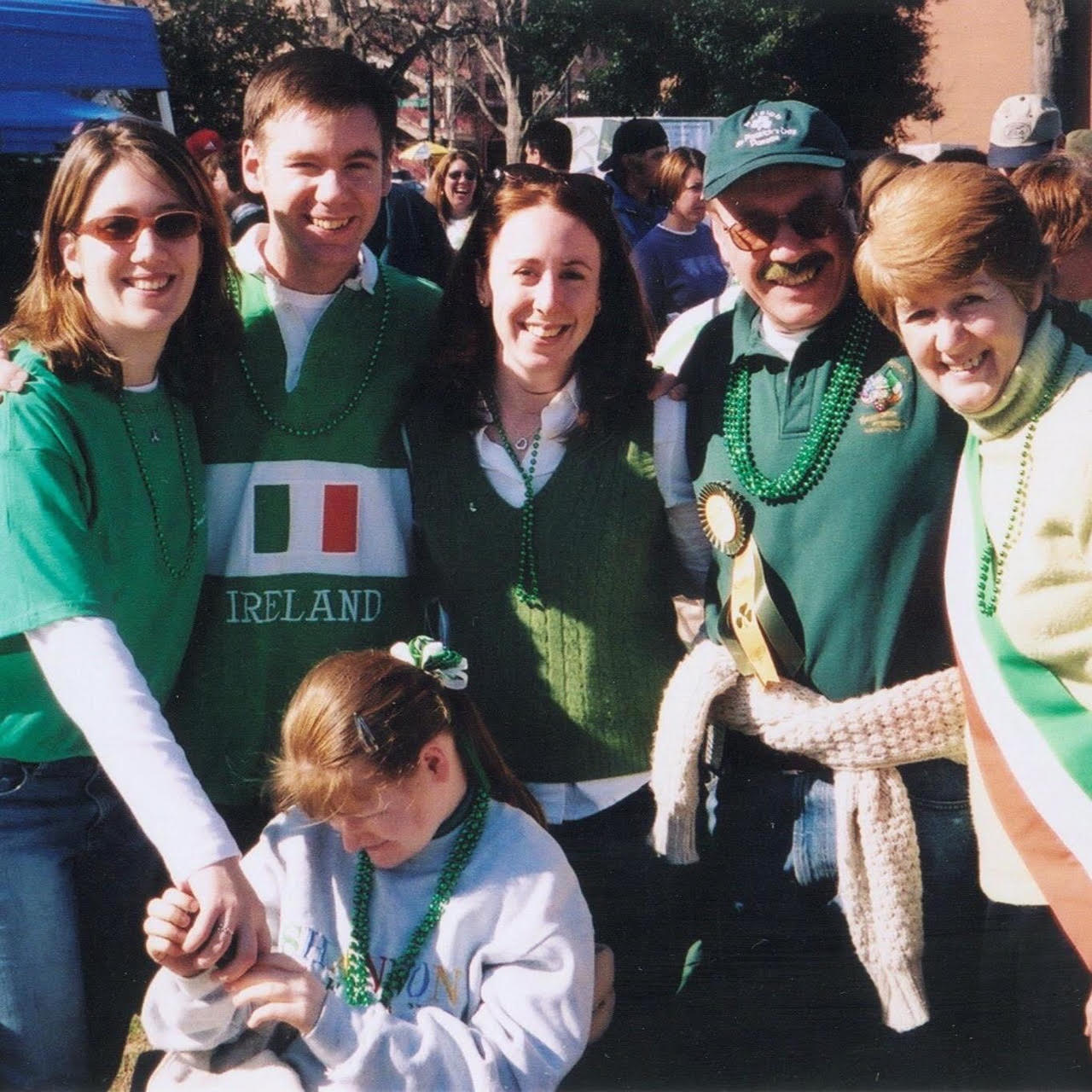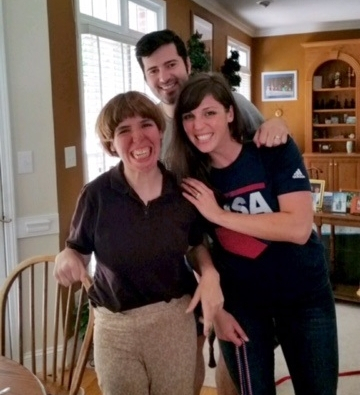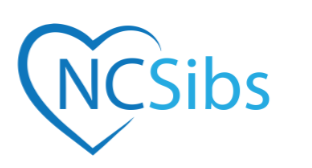First In Families Brings Together Adult Siblings of People with Disabilities
 The Mellage FamilyOn her birthday, when her cake with flaming candles was placed in front of her, Kelly Mellage would close her eyes and wish for the same thing year after year – that her big sister Angela would talk. Kelly didn’t care what Angela would say, she just wanted to hear her sister’s voice. Then she would blow out the candles.
The Mellage FamilyOn her birthday, when her cake with flaming candles was placed in front of her, Kelly Mellage would close her eyes and wish for the same thing year after year – that her big sister Angela would talk. Kelly didn’t care what Angela would say, she just wanted to hear her sister’s voice. Then she would blow out the candles.
That wish hasn’t come true, yet. Forty-seven years ago, Kelly’s older sister Angela was born with intellectual and developmental disabilities (I/DD) that impacted her independence profoundly. She is non-speaking, lives with seizures and requires constant supervision. Although Angela walked as a child, she now uses a wheelchair and requires the support of multiple caregivers to help meet many needs such as personal care, and learning new skills.
Angela, Kelly and their younger brother, Brian grew up in New Jersey where friends and family took Angela’s physical and mental challenges in stride. But a move to Raleigh, North Carolina when Kelly was high school age meant she had to start all over ‘explaining’ to her peers about Angela. Growing up, Kelly never knew a single person who was a sibling of a person with I/DD like she was.
Enter the North Carolina Council on Developmental Disabilities (NCCDD) Sibling Support Initiative, managed by First In Families of NC (FIFNC), which address the various needs and barriers that adult siblings of a person with an intellectual or other developmental disabilities face. But the initiative also lets us all hear the dreams and interests held by these adult siblings.
“As an adult, I do talk about Angela easily and I thank God that He gave her to us. What I have found with the Sibling Support initiative (NC Sibs) is that it gives us permission to openly talk about our siblings – the good, the bad, the ugly – with others who truly get it,” explains Kelly. “There is power in sharing our stories and being truly understood and validated.”
Across the State, in Boone, NC, is Allison Dodson, the middle sister of three. “Jennifer is the oldest in our family. She was born with a rare genetic disorder, Tuberous Sclerosis, which can affect people in a spectrum of severity. Her disability causes seizures, impairs intellectual development and has created some physical disabilities due to the location of tumors in her brain and other areas of her body,” explains Allison.
Allison and Kelly found each other through NC Sibs. They both share the knowledge that one day, as their parents age beyond the ability to care for their siblings with disabilities, Kelly and Allison will need to step into that role.
“I’m just now beginning to learn about the systems in place that provide support resources to Jennifer, and I feel overwhelmed at trying to absorb all of the information available. I’m grateful to have NC Sibs as a credible and empathetic network of support as I prepare to eventually move into a more active “caretaker” role in my older sister’s life,” says Allison. Allison with Jennifer (left)
Allison with Jennifer (left)
Connecting with others who have brothers and sisters with I/DD has allowed the group, including Kelly and Allison, to talk about what they have lived through. They also get the chance to talk about the person their sibling is, beyond whatever challenges they may experience.
Jennifer “is tenacious and passionate, and isn’t afraid to challenge systems to get her point across. She loves music, M&Ms, hugs, and Oprah,” shares Allison.
Plus, the group reminds each other that they each have lives, too, outside their sibling relationships. “As a sibling, much of the family’s attention is always focused on the child with special needs,” explains Kelly.
While understandable, other siblings often get lost in the shuffle. NC Sibs provides a chance to recognize the members as unique individuals, too. They talk about their careers, their pets, their hobbies- relaxing in an important way among peers who understand them well.
The initiative offers a variety of opportunities to brothers and sisters of people with disabilities. Sibling events, monthly calls and both public and private Facebook groups help these siblings meet each other. In addition, FIFNC provides help in understanding and navigating the system of services and supports for their brother or sister with I/DD.
“Being the sibling of a person with disabilities is such a unique experience. The challenges, milestones, and successes are often powerful moments that shape our relationship with our family and our own personal development. I’m grateful to be connected to a network of people who have similar experiences and understand the scope of what it means to be a sibling,” adds Allison.
To provide ongoing support and connection for even more siblings of people with I/DD, North Carolina started its very own chapter of National Sibling Leadership Network called NC Sibs. NC Sibs is a statewide group of adult siblings of individuals with developmental disabilities, and it hopes to continue beyond the Council funding to connect siblings with one another to provide support and information specific to the unique aspects of the adult sibling relationship.
Connecting to others who have similar circumstances, finding resources to help support their sibling and family, and gathering information on planning for the future are common needs expressed by siblings.
 As a part of NC Sibs efforts to engage more siblings, caregivers, parents, and professionals, the chapter’s leaders together with FIFNC staff will be traveling across the state in September 2016 to share resources, provide information about the network, and gather feedback about what siblings need. Get more details on the NC Sibs Statewide Sibling Tour.
As a part of NC Sibs efforts to engage more siblings, caregivers, parents, and professionals, the chapter’s leaders together with FIFNC staff will be traveling across the state in September 2016 to share resources, provide information about the network, and gather feedback about what siblings need. Get more details on the NC Sibs Statewide Sibling Tour.